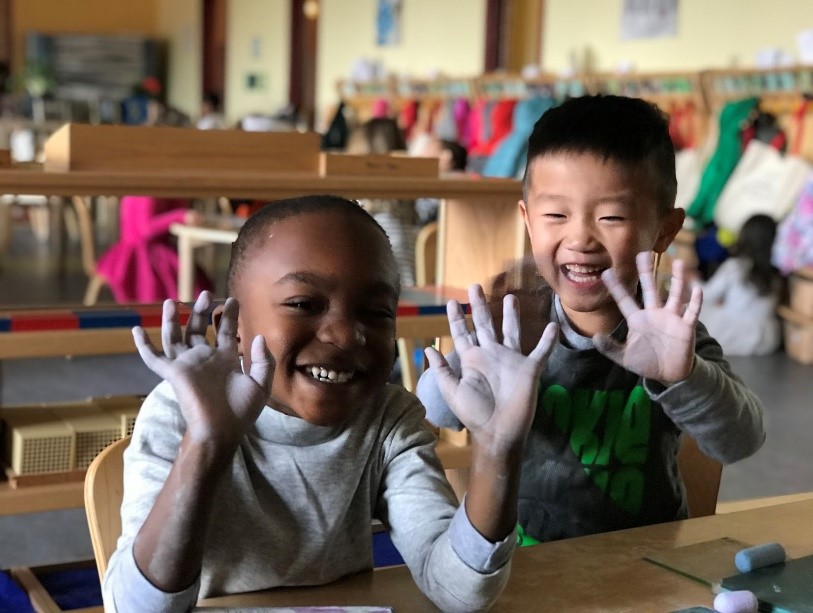

“Children learn more from what you are than what you teach.”
I started out writing this article about how important it is to model behavior. The title was “Be the Change You Wish to See In Your Child.” And then I thought…yuck. As parents and teachers, we tend to take ourselves very seriously. We know children watch and mimic our every move. It’s important to show them how to be focused, serious, and strong. But there are also times, and this is just as imperative, when we should just be silly and illustrate for them through our behavior that we are human. We make mistakes – big and small. When we loosen our vice grip on being perfect we invite our children to do the same – practicing patience with themselves and others.

This weekend I was sitting in a Montessori teacher training class showing a teacher next to me a picture of two children in my class last year. They were working on writing numbers on a chalkboard and had made a huge mess. I caught them amidst a cloud of chalk cracking each other up. For some, this scene may have caused a heart arrhythmia. Montessori teachers are taught to be precise, slow, graceful in their movements, and deliberate in everything they do – with good reason. Children pick up these characteristics and will mimic you exactly. But you could not possibly look at these boys and rain on their parade because they weren’t technically “doing the right thing” with the lesson. Sometimes the more important lesson is to be present and revel in wonder at these fleeting, silly moments.
When I showed the picture to the teacher next to me, she said “Your class looks like so much fun. I had no idea it’s okay to bring your personality into the classroom.” If you’ve met me, you’ve probably been frightened by my enthusiasm at some point, (I’m looking at you parents I interact with at the front desk in the morning). Tempering my personality in the classroom (or anywhere) has never worked out very well. However, the more time I spend around children the more I realize the value in sharing your sense of humor and excitement with them. It’s through our behavior and demeanor that they learn emotional intelligence, empathy, and communication – all things that are difficult to formally teach but can be easily infused with consistent exposure.


Humor can be a great way to forge a connection with a child. Instead of insisting your child put on her shoes within an imposed time limit, which often leads to stubbornness or frustration and culminating in a battle of wills, (of which you will never win against a three-year-old), try joking that you are going to see if her shoes fit on your feet or question who can get them on faster. Watch how quickly it gets done. An emotional connection built over time with a child is an essential element that ensures the child will learn everything better from you. You’ll also find incorporating more play and silliness into your daily routine makes children want to listen to you and, subsequently, take it more seriously when you are firm.
Another way we can connect is not trying to hide it when we make a mistake. When we point out to a child that we have made a misstep or are having a hard time and we talk to them about it, we show them it’s okay to try something new and not get it on the first try – but to be resilient, admit our shortcomings, and conquer them or move on. Gauge when it is appropriate to share your feelings about having failed. Admitting we are frustrated or sad demonstrates that it’s okay to feel this way. We can then demonstrate how to cope through addressing our feelings and talking about them before moving on. Talking about our own experiences ensures our children know how to identify and label their feelings in a healthy way, feel them, and move on, rather than push them down, leading to larger problems in adulthood.
Children are a gift. When we’re caught up in the everyday stresses of life how often do we reflect on how grateful we are? How often do we stop? Stop teaching. Stop directing. Stop fretting. Stop comparing. Stop doing, and be completely present with them? Whenever I am having a particularly stressful day, I visit my old classroom and am immediately reminded of what is important. All a child wants is for you to take some time to play with them, show them love, and attention. They don’t care you’re not perfect, if you admit you made a mistake or, god forbid don’t know the answer to something. They benefit most when we are authentic and honest with them about our blunders and imperfect, silly sides. And in return they remind us that life is full of opportunities for wonder and fun and is not always the serious business we treat it to be. We get so focused on what we want to teach children, we forget to pause and absorb everything they have to teach us.

